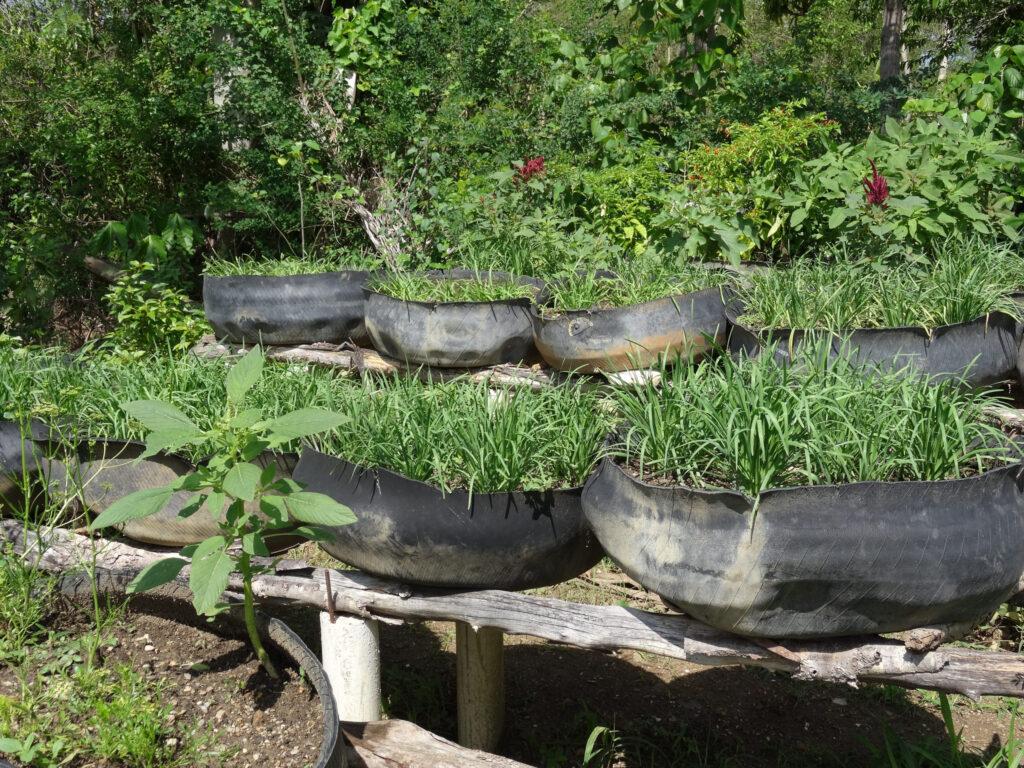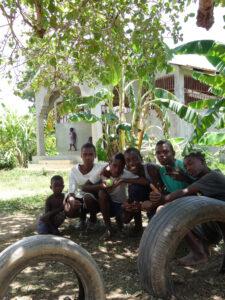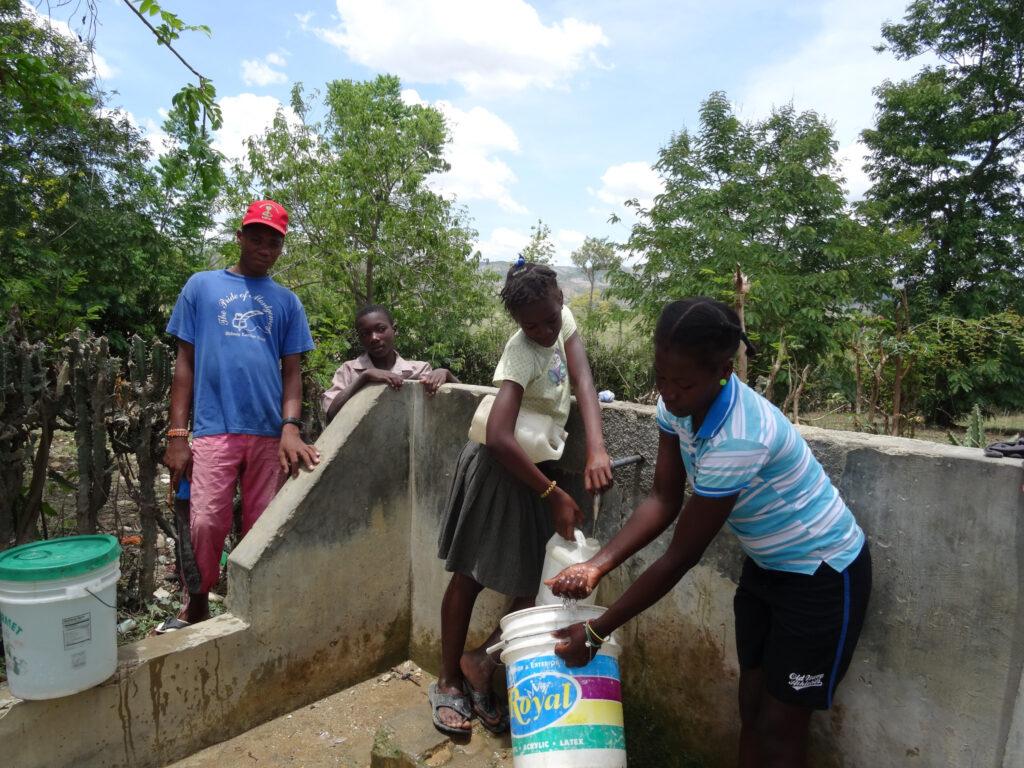Movement Building at the Heart of Haitian Peasants’ Response to Climate Change
This article originally appeared on ILEIA.
Social movements in the Haitian countryside are dealing with the politicized challenge of climate change through methods that reach back to a rich agrarian tradition and weave in contemporary grassroots solutions. Deep in the Central Plateau, the Peasant Movement of Papaye (MPP) is leading the way towards a new Haiti centered on food sovereignty and climate justice. These twin proposals are not only a way out of hunger and the climate crisis, but are political tools meant to contribute to systemic change in Haiti and beyond.
Haitians are used to navigating the intersections that occur where nature meets politics, and the small Caribbean country’s landscape shows the scars of that process. Bare mountains that were once green loom over makeshift, seaside cities where the rural majority once farmed and fished. Every now and then, Haiti, paradoxically isolated from and dependent on the rest of the world, makes the news: a state coup, a massive earthquake, or yet another hurricane. And today, while receiving a lesser degree of international attention than these monumental moments, the increasing impacts of climate change are threatening to break Haiti’s already weakened agricultural backbone.
Climate Disruptions
In October 2016, the country was hit by Hurricane Matthew, a category 4 storm which completely flooded large swaths of the country, and devastated Southern Haiti. Hurricane Matthew hit just weeks before harvest, and the country has not recovered since. As a matter of fact, farmers in Haiti are now dealing with periodic flooding. Without respite, they have gone from one extreme to another: in the 2014/15 season, the county’s agricultural production fell by more than 80% due to drought.
Most of Haiti’s trees have been cleared: between 1804 and 2015, forest cover plummeted from 80% to just 1.25% of the land surface. The resulting erosion has severely compromised soil fertility and access to drinking water. Degraded soil and water resources, combined with an extended drought, have left about 70% of the population without adequate food and water. When natural disasters hit the ground, the lack of forest causes severe amounts of runoff, exacerbating the effects of flooding associated with the hurricane season.

The Peasant Movement of Papaye (MPP) is the largest peasant movement in Haiti, located in the Central Plateau. The Central Plateau mirrors the interconnected trends of deforestation and climate disruptions observed elsewhere across Haiti. Gislaine St. Fleur, the coordinator of MPP’s women’s programs sees climate change as one of the biggest challenges facing Haitian people. “The majority of families live off the land. With climate change, people can’t produce enough food to feed themselves and take care of their children,” she explains. The rainfall patterns in Haiti have become increasingly unreliable, with more frequent droughts on the one hand, and more powerful hurricanes on the other. This situation has strengthened MPP’s resolve to engage with soil and water conservation, as well as reforestation, to adapt and build resilience to climate change.
Grounded Solutions
“Any meaningful solution to climate change starts from the ground,” says Ginette Hilaire, a member of MPP. Depleted soil means less nitrogen is absorbed, more carbon is released into the air (producing more greenhouse gases), and the ground itself cannot handle the rainy season, let alone the storms and hurricanes that are occurring with more frequency. What’s more, any real solution also starts from the grassroots. The best chance to protect, restore and promote sustainable use of ecosystems, combat desertification, maintain biodiversity and halt and reverse land degradation come from those most affected by land grabs, ecological disaster and deforestation.
With a clear analysis of the climate crisis and the consequences it brings for Haiti, which is already environmentally devastated, MPP works to recover the environment to a degree that peasant farmers can produce enough healthy food to feed the nation. Solutions to, and consequences of, this kind of climate disruption are tied to land rights, food sovereignty and ecological resilience. The same is true around the world. The United Nations agrees, agroecologists agree, small farmers agree, and even a growing number of economists and politicians agree.
The MPP has planted more than 30 million trees over the past 40 years.
The fight against climate change in Haiti is thus a political one. For Haitian social movements, agroecology fills the gaps left by a fragile state and aggressive external intervention. It is the point at which food sovereignty meets climate justice.
Building the Movement for Agroecology
The MPP is at the forefront of building alternatives that will make a real difference for people in Haiti. Formed in 1973, the movement has 61,000 members divided into 4,179 gwoupman, a traditional form of organizing. Within the gwoupmans peasants share land, engage in economic projects, and save money through collective savings accounts and livestock. Public services have, for decades, failed those living in rural areas, with an increasingly centralised Haitian government. Agribusiness and other profit-driven activities in the countryside have only magnified the isolation of the peasantry. Social movements like the MPP have taken on the challenge of providing much needed services to rural working people, including education, health care, and maintenance of roads.

For the MPP, whether working for climate, economic, or other forms of justice, it all starts with securing natural resources, which in turn starts with agroecology. As Juslene Tyresias, an MPP leader explained, “We plant a lot of trees. We conserve water in the soil. We build cisterns and wells so that people can have water.” The MPP has planted more than 30 million trees around Papaye over the past 40 years, while maintaining a wide variety of other services for those living there. But perhaps even more importantly, they are working to replicate their efforts across scales.
MPP recognizes that bringing agroecology to the national dialogue would require sustained pressure from the grassroots, and that it would have to extend far beyond Papaye or the Central Plateau. The National Congress of the Papaye Peasant Movement (MPNKP) was conceived by MPP in order to replicate agroecology and related projects in all ten Haitian departments. Their work is similarly rooted in popular education and organizing. MPP and MPNKP are both members of the transnational agrarian movement La Vía Campesina that has worked with a variety of stakeholders – from national governments to international intergovernmental organisations – to incorporate food sovereignty, agroecology, and climate justice into regulatory frameworks.
In the Americas, MPP has hosted and participated in several key learning exchanges. At the invitation of Haitian social movements, and under the banner of La Vía Campesina, Brazilian social movements traveled to Haiti over multiple years to work with their Haitian counterparts in the field of agroecology. This was politically significant in that Brazil has been heavily involved in MINUSTAH, the UN stabilization mission that Haitian social movements regard as an occupational force in their country. MPP activist, Juslene Tyresias, traveled to New Orleans as part of the Climate Justice Alliance delegation to commemorate the 10-year anniversary of Hurricane Katrina. The event was organised by Gulf South Rising, a movement created to highlight the impact of the global climate crisis on the Gulf South region of the US.
Visions for the Future
The MPP has made great progress in planting trees and building infrastructure—as well as building a multi-level social and environmental justice movement. The group aims to intensify its outreach and educational capacity this year back home in Papaye. Specifically, that will include a training for women in agroecology and home gardening, a training for peasants in soil conservation techniques that will be replicated throughout the community by the trainees, a training on seed selection and conservation, and yet another training on production techniques and fertilizer application with natural insecticide. Even more specifically to climate change, MPP is conducting radio broadcasts to develop rural communities’ awareness of early planting methods that are adapted to climate change. They will then hold a conference and climate change debate for some 100 people. In their network of nurseries, MPP is set to produce 100,000 fruit and forest seedlings. At the same time, they will expand alternative energy and solar panel production for electricity, including alternatives to charcoal for cooking. Water will continue to be a focus of the overall 2017 working plan, especially through the construction of cisterns and wells.

But the peasant movement continues to face many obstacles, from land grabs and climate change to the continued acceleration of deforestation. MPP recognizes that these challenges are not unique to Haiti, and is therefore committed to working hand in hand with social justice networks at the national, regional, and transnational levels. For these social and environmental justice movements, agroecology is a response to the politicized and unequal impacts of climate change.


